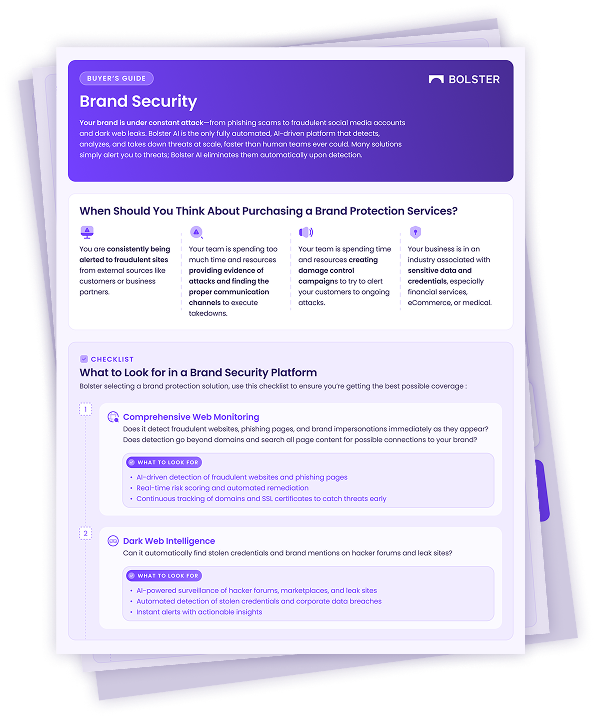Brand infringement is any unauthorized use of a brand’s identity, assets, or reputation in a way that misleads consumers or supports fraudulent activity. It includes fake sites, counterfeit products, copied…

Glossary of Cybersecurity Terms
Keeping up with the constant influx of new cybersecurity terminology can be difficult. However, Bolster is here to help. Our glossary provides clear definitions for the latest important terms used in the cybersecurity and information security industry that you should be familiar with.

How can we help?
What is External Cybersecurity (and Why Brand Protection Belongs Inside of It)
External cybersecurity is the practice of identifying, monitoring, and securing all assets, services, and digital touchpoints that are accessible from the public Internet. These internet-exposed elements form the first set…
What is Brand Enforcement?
Brand enforcement is when a company removes, disables, or shuts down online content that abuses its brand. This includes filing takedown requests, requesting domain suspension, removing counterfeit listings, disabling social…
Urlscan.io: Safe & Approved Scanner Option for Your Toolbox
What is Urlscan.io? Urlscan.io is a powerful scanner technology that allows IT security and risk management professionals to analyze and understand the potential risks associated with a particular URL. It…
Understanding Phishing Hosting to Combat Attacks
Phishing hosting refers to the infrastructure that attackers use to run phishing pages, distribute phishing kits, and keep malicious sites online for as long as possible. Rather than relying on…
Software Copyright Infringement: Mitigating the Threats to IT Security
Unlike media or written works, software copyright infringement often introduces direct cybersecurity and compliance risks because unauthorized software can contain malicious code or lack security updates. Understanding Software Copyright Infringement…
Brand Protection
Brand protection refers to the measures companies take to safeguard their brand against counterfeit products, unauthorized use of trademarks, and other forms of infringement. This involves actions such as monitoring…
Phishing Payload
A phishing payload is the malicious content or software that is delivered to a victim through a phishing attack (see phishing kits). This can include malware, ransomware, or a link…
Phishing Kits 101: How to Identify and Mitigate Attacks
Phishing is one of the most common cyber threats to organizations, and phishing kits are a significant driver of such activity. A phishing kit is a collection of tools, and…
Brand Impersonation: A New Threat to Your Business Reputation
What Is Brand Impersonation? Brand impersonation refers to an individual or group pretending to be a brand (or affiliated with it in some way) to obtain sensitive information from current…



